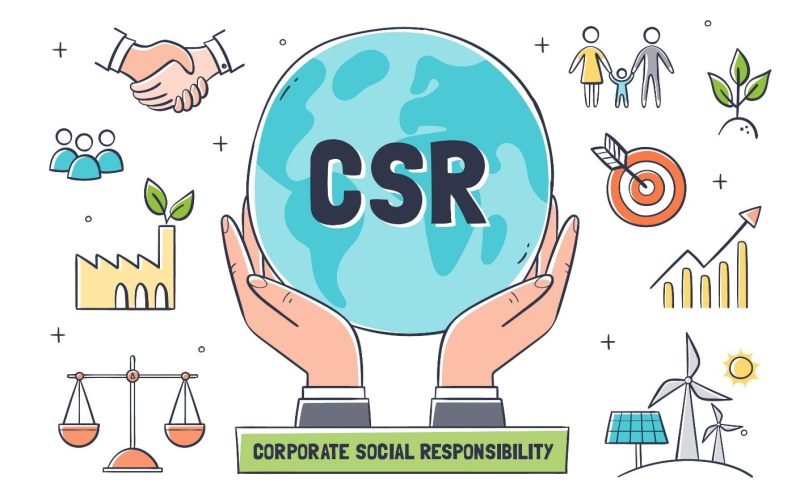Trends in Corporate Social Responsibility: Navigating the Future of Business Ethics
Corporate Social Responsibility (CSR) has evolved from a peripheral concern to a central tenet of modern business strategy. As stakeholders increasingly prioritize ethical considerations, companies are compelled to adopt robust CSR practices. This article explores the latest trends in CSR, providing an informative overview of how businesses are navigating the complexities of social responsibility in 2023 and beyond.
Integration of ESG Criteria
Environmental, Social, and Governance (ESG) criteria have become the cornerstone of CSR strategies. Investors and consumers alike are scrutinizing companies based on their ESG performance. This trend is driving businesses to integrate ESG criteria into their decision-making processes. Companies are now more transparent about their environmental impact, social policies, and governance structures, often publishing detailed ESG reports to demonstrate their commitment to sustainable practices.
Sustainable Supply Chains
Sustainable supply chains are no longer optional; they are a necessity. Companies are increasingly held accountable for the environmental and social impacts of their entire supply chain. This trend has led to a rise in the adoption of sustainable sourcing practices, the use of eco-friendly materials, and the implementation of fair labor practices. Businesses are also leveraging technology to track and manage their supply chain sustainability, ensuring compliance with global standards.
Climate Action and Carbon Neutrality
Climate action has taken center stage in CSR initiatives. With the growing urgency of climate change, companies are setting ambitious goals to reduce their carbon footprint. Carbon neutrality and net-zero emissions targets are becoming standard practice. Businesses are investing in renewable energy, carbon offset projects, and energy-efficient technologies to achieve these goals. Additionally, many companies are joining global coalitions and pledging support for international climate agreements.
Diversity, Equity, and Inclusion (DEI)
Diversity, Equity, and Inclusion (DEI) have become critical components of CSR. Companies are recognizing the importance of creating inclusive workplaces that reflect the diversity of society. DEI initiatives are being implemented at all levels, from recruitment and retention to leadership development and corporate culture. Businesses are also addressing pay equity, providing equal opportunities, and fostering an environment where all employees can thrive.
Community Engagement and Social Impact
Community engagement and social impact are key aspects of CSR. Companies are increasingly involved in local communities, contributing to social causes and supporting community development. This trend is seen in the rise of corporate philanthropy, volunteer programs, and partnerships with non-profit organizations. Businesses are also aligning their social impact initiatives with their core values and business objectives, ensuring that their contributions are meaningful and sustainable.
Transparency and Accountability
Transparency and accountability are fundamental to effective CSR. Stakeholders demand clear, honest communication about a company’s CSR activities and outcomes. This has led to the adoption of rigorous reporting standards and third-party audits. Companies are using frameworks like the Global Reporting Initiative (GRI) and the Sustainability Accounting Standards Board (SASB) to provide comprehensive and comparable CSR reports. Transparency not only builds trust but also allows companies to benchmark their performance and identify areas for improvement.

Ethical Consumerism
Ethical consumerism is reshaping the market landscape. Consumers are increasingly making purchasing decisions based on a company’s CSR performance. They prefer brands that demonstrate a commitment to ethical practices, environmental sustainability, and social responsibility. This trend is driving companies to adopt more responsible marketing strategies, ensuring that their products and services align with the values of conscious consumers.
Employee Well-being and Mental Health
Employee well-being and mental health have become priorities in CSR. Companies are recognizing that their responsibility extends beyond physical health to include mental and emotional well-being. Initiatives such as flexible working arrangements, mental health support programs, and wellness activities are becoming commonplace. By fostering a supportive work environment, businesses can enhance employee satisfaction, productivity, and retention.
Technological Innovation for CSR
Technological innovation is playing a crucial role in advancing CSR. Companies are leveraging technologies such as artificial intelligence (AI), blockchain, and big data to enhance their CSR efforts. For example, AI can be used to optimize energy usage and reduce waste, while blockchain can ensure transparency and traceability in supply chains. Big data analytics can help companies measure and track their CSR performance, providing insights that drive continuous improvement.
Regulatory Compliance and Ethical Governance
Regulatory compliance and ethical governance are integral to CSR. Governments and regulatory bodies are introducing stricter regulations related to environmental protection, labor rights, and corporate governance. Companies are required to comply with these regulations and often go beyond compliance to demonstrate their commitment to ethical practices. Ethical governance involves creating robust policies, ensuring board diversity, and fostering a culture of integrity and accountability.
Conclusion
The landscape of Corporate Social Responsibility is dynamic and ever-evolving. As businesses navigate the complexities of CSR, they must stay attuned to emerging trends and stakeholder expectations. By integrating ESG criteria, fostering sustainable supply chains, taking climate action, promoting DEI, engaging with communities, ensuring transparency, catering to ethical consumers, prioritizing employee well-being, leveraging technology, and adhering to regulatory compliance, companies can build a resilient and responsible business model. In doing so, they not only contribute to a sustainable future but also enhance their reputation, competitiveness, and long-term success.










